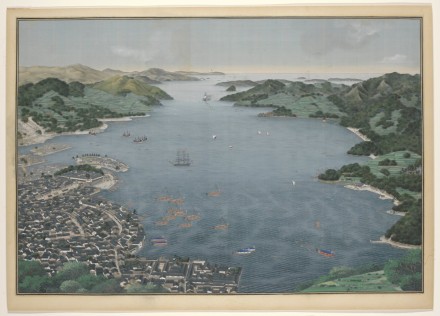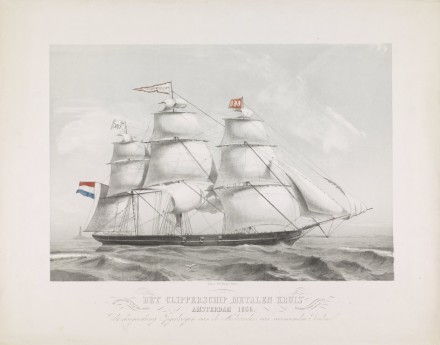History
From Rotterdam...
The Cadsandria was launched on the 5th of September in the year 1857. It was a clipper frigate built by shipwright W.C. Hoogendijk junior and was meant for trans-oceanic shipping (Nieuwe Rotterdamsche Courant, 1857). Captained by J.A.C. Gerlach, the Cadsandria was a merchant vessel, yet also fit to take on a number passengers besides the crew and the captain's wife. Thus when the Cadsandria left Rotterdam on the 4th of January in 1858, she additionally carried on board as passengers three civilians, three officers and 133 petty officers. The military men were to be stationed in Batavia (present-day Jakarta) where the Cadsandria called in somewhere between the 10th and the 13th of April that same year.
...to Japan
After the passengers left the vessel, the captain and his crew continued their journey first to Samarang and then back to Batavia, before heading on towards Nagasaki in Japan on the 12th of July (De Tijd, 1858. When the Cadsandria was waiting to enter the port of Nagasaki, the ship got into a hurricane. According to the captain, the ship was waiting for vessels to tow her in, which were not forthcoming. In the night of August 7th, she was caught in a typhoon. Despite all efforts of the crew to keep her from drifting from their anchorage, the ship was driven towards the cliffs behind the Takabokojima (called Papenberg or 'papist mountain' by the Dutch), an islet in front of the entrance towards Nagasaki Bay.
Shipwrecked
Finally, in the morning of of the 8th August, the Cadsandria was shipwrecked. According to contemporary reports, the ship sunk until the top of its mizzen mast. The ship and cargo were deemed lost, and a sailor died saving the life of Anna Maria Fischer, captain Gerlach's wife. Anna and the surviving crew were then put up on Dejima. This is artificial island in the Bay of Nagasaki used as a trading post. It was originaly inhabited by the Dutch, and operated by the Dutch East India Company (VOC), yet since Japan's reopening to foreigners it had been inhabited by a variety of Europeans.
Despite Anna Maria Fischer's initial survival, she was in a bad shape (De Oostpost, 1858). She would later die in a local hospital and was afterwards buried on the Dutch cemetery of Nagasaki where her grave can still be visited today.

Description
Type: clipper frigate
Yard: W.C. Hoogendijk jr., Capelle aan de IJssel
Owner: N.A. Koning & A.H. Liebert
Materials: Wood, the hull was coppered
Tonnage: 798 tonnes/399 last

The clipper ship Metalen Kruis, of a similar period as the Cadsandria, Charles Binger, print, 1856.
| Master | Gerlach, J.A.C |
|---|---|
| Length | 147 ¾ feet (45 m) |
| Width | 23 ½ feet (7.2 m) |
| Draft | 16 ¾ feet (5.1 m) |
Status
The wreck has not been found.
References
- Nieuwe Rotterdamsche courant :
- Algemeen Handelsblad.
- De Tijd,
- Nieuwe Rotterdamsche Courant.
- marhisdata.nl.
Cadsandria.